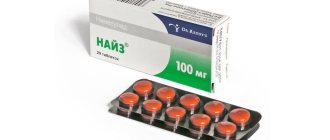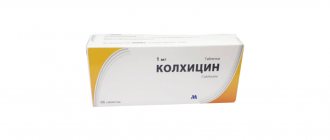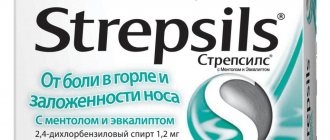Metypred
Synthetic GCS. It has anti-inflammatory, antiallergic, immunosuppressive effects, increases the sensitivity of beta-adrenergic receptors to endogenous catecholamines.
Interacts with specific cytoplasmic receptors (receptors for GCS are found in all tissues, especially in the liver) to form a complex that induces the formation of proteins (including enzymes that regulate vital processes in cells).
The effect of methylprednisolone on protein metabolism: reduces the amount of globulins in plasma, increases the synthesis of albumins in the liver and kidneys (with an increase in the albumin/globulin ratio), reduces the synthesis and enhances protein catabolism in muscle tissue.
The effect of methylprednisolone on lipid metabolism: increases the synthesis of higher fatty acids and triglycerides, redistributes fat (fat accumulation occurs mainly in the shoulder girdle, face, abdomen), leads to the development of hypercholesterolemia.
The effect of methylprednisolone on carbohydrate metabolism: increases the absorption of carbohydrates from the gastrointestinal tract, increases the activity of glucose-6-phosphatase (increases the flow of glucose from the liver into the blood), increases the activity of phosphoenolpyruvate carboxylase and the synthesis of aminotransferases (activates gluconeogenesis), promotes the development of hyperglycemia.
The effect of methylprednisolone on water-electrolyte metabolism: retains sodium and water in the body, stimulates the excretion of potassium (mineralocorticoid activity), reduces calcium absorption from the gastrointestinal tract, reduces bone mineralization.
The anti-inflammatory effect is associated with inhibition of the release of inflammatory mediators by eosinophils and mast cells, induction of the formation of lipocortins and a decrease in the number of mast cells producing hyaluronic acid, with a decrease in capillary permeability, stabilization of cell membranes (especially lysosomal) and organelle membranes. Acts on all stages of the inflammatory process: inhibits the synthesis of prostaglandins at the level of arachidonic acid (lipocortin inhibits phospholipase A2, suppresses the liberation of arachidonic acid and inhibits the biosynthesis of endoperoxides, leukotrienes, which also contribute to the processes of inflammation and allergies), the synthesis of pro-inflammatory cytokines (including including interleukin 1, tumor necrosis factor alpha), increases the resistance of the cell membrane to the action of various damaging factors.
The immunosuppressive effect is caused by the involution of lymphoid tissue, inhibition of the proliferation of lymphocytes (especially T lymphocytes), suppression of the migration of B cells and the interaction of T and B lymphocytes, inhibition of the release of cytokines (interleukin-1, 2, interferon gamma) from lymphocytes and macrophages and decreased antibody formation.
The antiallergic effect develops as a result of a decrease in the synthesis and secretion of allergy mediators, inhibition of the release of histamine and other biologically active substances from sensitized mast cells and basophils, a decrease in the number of circulating basophils, T- and B-lymphocytes, mast cells, suppression of the development of lymphoid and connective tissue, reduction sensitivity of effector cells to allergy mediators, inhibition of antibody formation, changes in the body's immune response.
In obstructive diseases of the respiratory tract, the effect is due mainly to inhibition of inflammatory processes, prevention or reduction of the severity of swelling of the mucous membranes, reduction of eosinophilic infiltration of the submucosal layer of the bronchial epithelium and deposition of circulating immune complexes in the bronchial mucosa, as well as inhibition of erosion and desquamation of the mucosa. Increases the sensitivity of beta-adrenergic receptors of small and medium-sized bronchi to endogenous catecholamines and exogenous sympathomimetics, reduces the viscosity of mucus by reducing its production.
Suppresses the synthesis and secretion of ACTH and, secondarily, the synthesis of endogenous corticosteroids.
Inhibits connective tissue reactions during the inflammatory process and reduces the possibility of scar tissue formation.
Indications for use of the drug Metipred
Conditions requiring systemic therapy with GCS are inflammatory and systemic rheumatic, autoimmune diseases, allergic conditions, anaphylactic shock, asthma and other lung diseases, as well as in order to reduce intracranial pressure (for example, with cerebral edema due to neoplasms), transplant rejection; some dermatological, hematological, hepatic, neurological (eg multiple sclerosis, myasthenia gravis), renal and gastrointestinal diseases (eg ulcerative colitis, Crohn's disease). Methylprednisolone is also used as an antiemetic in chemotherapy and as a component of regimens for the treatment of leukemia, lymphoma and malignant myeloma.
The effect of the drug on the female and male fetus
After conducting a lot of research, scientists have not established the teratogenic (damaging) effect of Metypred on the fetus. The active substances of the drug are not involved in the development of intrauterine pathologies of the child. It also does not have a toxic effect on the fetus, nor does it cause delays in the development and growth of the baby. However, some caution is observed in cases where a boy develops in the womb. Metypred is able to reduce the synthesis of androgens, so the doctor reduces the average dose of the drug. The drug does not have a negative effect on the hormonal background of a female fetus.
Taking any medications in the early stages of pregnancy is undesirable for the reason that during these days the formation of all major organs of the fetus occurs.
Doctors allow the use of Metipred at the beginning of pregnancy if there is a clear threat of miscarriage, the woman has rheumatism or has been diagnosed with an autoimmune pathology.
Metypred during pregnancy and lactation
During pregnancy , Metypred (especially in the first trimester) can be prescribed only for health reasons. Since corticosteroids tend to pass into breast milk, when using the drug during the lactation period, breastfeeding should be stopped. This statement is confirmed by many reviews of Metipred when planning pregnancy.
Metipred for IVF is prescribed to regulate hormonal levels. Its use is undesirable, therefore it is indicated only in cases of extreme necessity as prescribed by a doctor.
Metypred price, where to buy
The price of Metipred tablets in Russia averages 180 rubles (4 mg / 30 pcs).
You can buy the drug in Ukraine for an average of 140 hryvnia (4 mg / 30 pcs).
- Online pharmacies in RussiaRussia
- Online pharmacies in UkraineUkraine
- Online pharmacies in KazakhstanKazakhstan
LuxPharma* special offer
- Metypred 16 mg tab.
N30 2600 rub. order
Pharmacy Dialogue
- Metipred (tab. 4 mg No. 30)Orion/Pharmacor production
RUB 324 order
show more
Pharmacy24
- Metypred 16 mg No. 30 tablets Orion Corporation, Finland
327 UAH. order - Metypred 250 mg No. 1 powder Orion Corporation/Hikma Pharmaceuticals (Portugal), S.A., Finland/Portugal
217 UAH. order
- Metypred 4 mg N30 tablets Orion Corporation/TOV "KUSUM PHARM", Finland/Ukraine
136 UAH order
PaniPharmacy
- Metypred tablets Metypred tablets 4 mg No. 30 Finland, Orion
157 UAH order
- Metypred tablets Metypred tablets. 4mg No. 100 Ukraine, Kusum Pharm LLC
427 UAH. order
show more
Treatment: recommended dosage
The dosage of the drug and the duration of treatment are determined individually. The tablets should be taken during or after meals. Take the medicine with a small amount of liquid.
The drug can be prescribed in an initial dosage of 4 mg - 48 mg per day. Such doses are used for various diseases that are mild. High doses (200-1000 mg/day) are prescribed for the following pathologies:
- Multiple sclerosis.
- Brain edema.
For organ transplantation, the dosage is calculated based on the patient’s body weight: 7 mg/kg/day. But if it is not possible to achieve the desired result after a certain time, then stop taking the drug and prescribe another type of therapy. For the treatment of children, if indicated, the dose of the drug is also calculated taking into account body weight.
The lyophilisate solution can be administered by intramuscular injection or intravenous infusion. The procedure involves slow injection. Moreover, if additional treatment is carried out in life-threatening cases, mitipred is administered intravenously over 30 minutes in an amount of 0.03 g/kg body weight every 6-8 hours. The procedures are repeated for no more than a day and a half.
After long-term therapy with the drug, you should not suddenly abandon the drug; the daily dose should be reduced gradually. Otherwise, a withdrawal effect may occur. This condition is characterized by depressive mood and aggression, increased fatigue and drowsiness.
Special instructions for the use of the drug Metypred
To avoid severe cardiovascular complications (hypotension, arrhythmia, bradycardia or asystole), the drug in high doses must be administered intravenously slowly. At the first stages of IV pulse therapy for severe pseudoparalytic myasthenia, the condition may worsen, in rare cases, even to respiratory depression requiring the use of mechanical ventilation. Correction of symptoms begins 2–3 days after the start of therapy. GCS should be used with caution and under medical supervision in patients with hypertension (arterial hypertension), congestive heart failure, mental disorders, diabetes mellitus (or a family history of diabetes), pancreatitis, diseases of the digestive tract (peptic ulcer, local ileitis, ulcerative colitis or diverticulitis with increased risk of bleeding and perforation), osteoporosis, glaucoma and predisposition to thrombophlebitis. Patients with bleeding disorders should be under medical supervision. GCS can complicate the diagnosis of complications from the digestive tract, since they help reduce the severity of pain and also mask the latent period of hyperparathyroidism. Long-term use of GCS suppresses the pituitary-adrenal axis, which causes the development of secondary insufficiency of the corticoadrenal response, accompanied by complications and exacerbations of diseases. For hypothyroidism or severe liver disease, methylprednisolone should be prescribed in a reduced dose. Long-term use in children may cause growth retardation. Therefore, treatment should be limited to taking the drug in minimal doses for the shortest period. Methylprednisolone crosses the placental barrier and is excreted in breast milk. Breastfeeding should be avoided during prolonged systemic therapy with methylprednisolone. It is necessary to evaluate the benefit/risk ratio when taking methylprednisolone during pregnancy. GCS may increase the risk of stillbirth. Newborns whose mothers took corticosteroids during pregnancy should be examined to identify signs of hypoadrenalism, and if indicated, they are prescribed replacement therapy.
Contraindications
For short-term use for health reasons, the only contraindication is severe sensitivity to methylprednisolone or other components of the drug.
Use with caution when:
- pregnancy;
- closed-angle or open-angle glaucoma , poliomyelitis , acute psychosis , systemic osteoporosis ;
- hypoalbuminemia;
- nephrourolithiasis, severe chronic liver and/or renal failure ;
- endocrine diseases ( third and fourth degree obesity hypothyroidism , thyrotoxicosis , diabetes mellitus );
- diseases of the cardiovascular system (including myocardial infarction ), hyperlipidemia, arterial hypertension, severe chronic heart failure ;
- immunodeficiency states, lymphadenitis BCG vaccination , post-vaccination and pre-vaccination period;
- latent and active tuberculosis , systemic mycosis , strongyloidiasis , amebiasis , measles , chicken pox , herpes zoster in the viremic phase, herpes simplex ;
- diseases of the gastrointestinal tract ( diverticulitis , newly created intestinal anastomosis, latent or acute peptic ulcer , gastritis , esophagitis , duodenal and gastric ulcers .






